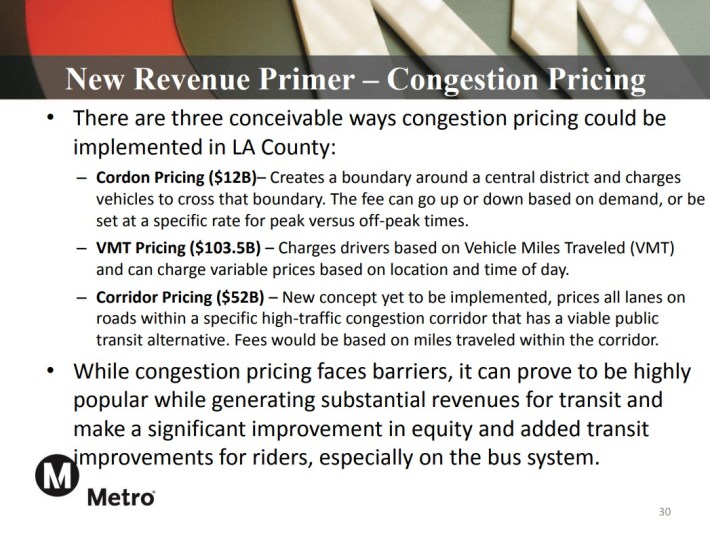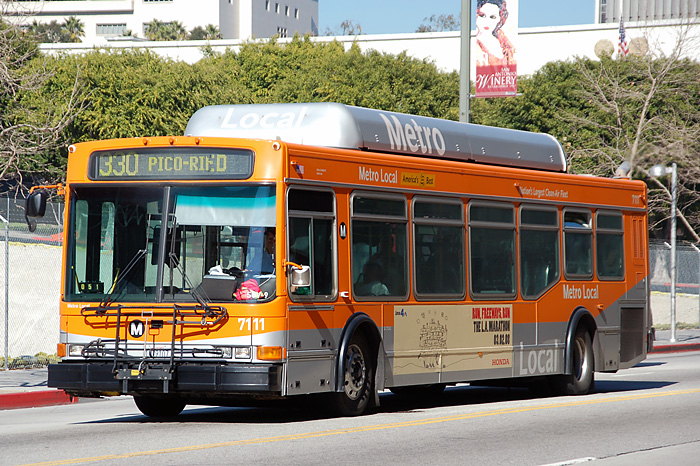
During yesterday's board meeting, Metro CEO Phil Washington announced that he favors congestion pricing, in conjunction with free transit.
Congestion pricing! Free transit! Free!
The statement was made during a question and answer exchange on potential funding for 28 by 2028 project acceleration for the Olympics. "Only congestion pricing will get rid of congestion," Washington said.
(This is a consensus among researchers, think tanks, transit advocates, civilized nations, and most Streetsblog editors. It is a truth rarely publicly acknowledged by transportation agencies, and essentially never stated by elected officials. Metro's campaign for Measure M frequently focused on a promise to "ease congestion.")

Washington's presentation touched on several "conceivable ways congestion pricing could be implemented in L.A. County." Washington opined that he preferred a corridor approach, where agencies could charge drivers and use that revenue to provide a frequent and robust "free transit" alternative. When questioned if this proposal was for free transit just during the Olympics, Washington responded that it would be free transit "forever and ever."
Streetsblog L.A. excitedly tweeted this out.
Media outlets ran with it; see coverage at The San Gabriel Tribune and Curbed.
What is going on?
Is there some kind of governmental conspiracy afoot (in the words of one skeptical boardmember) to "double-dip" and charge put-upon motorists over and over for freeways that their taxes already paid for?
(Let's not forget that motorists don't actually pay the full cost of building and maintaining roads. And note that boardmembers have never thought to suggest that transit fares are "double-dipping.")
Is Metro really planning to do congestion pricing? (That is, beyond the agency's successful ExpressLanes tolling projects?)
My friends questioned if Washington's bold statements might have been an effort to distract from the really crappy decisions to come out of the board meeting yesterday. In deciding Green Line operations, the Metro board screwed lower-income communities of color, choosing to favor the whiter, more suburban South Bay. In deciding what to do with funding for the canceled asinine North 710 Freeway, the Metro board approved a suite of asinine freeway-like road-widening projects.
Here's my take:
A few months ago, the Metro board said to Washington, "Give us a funding plan for 28 by 2028." This request came at a time when Republicans were essentially blocking federal transit funding. It was also a time when Republicans were pushing to repeal California's gas tax. The outlook for accelerating Metro mega-projects looked pretty slim. Frankly, at that time, the prospects for delivering Metro rail projects on their approved Measure M schedule wasn't looking good, either.
(I would say that, basically due to the Trump administration, any serious L.A. County transit project acceleration is a long shot. With Prop 6 defeated and talk of a green new deal, it looks better than it did a couple months ago. It's not impossible, but it would take some major rabbit-out-of-a-hat trick where the feds and the state kick down some serious money fairly soon.)
- congestion pricing
- federal money (something President Donald Trump mostly won't do for transit, especially for California, Los Angeles)
- state funds
- delaying bus electrification (something Mayor Eric Garcietti won't allow)
- selling station naming rights (something Supervisor Sheila Kuehl won't allow)
- cities could give up their Measure M local return funds (something cities won't do)
- borrowing lots of money (something the Metro board won't do)
- charging fees for TNCs and scooters
- canceling bike-share
(Note that the majority of the actual funding in play here would depend on things outside Metro's purview. The devils are in the details which aren't available. But, taking congestion pricing, which I would love for Metro to do, probably can't happen without approvals from the federal government, the state, county, and local city or cities. So the Metro board could approve a plan that tells Metro to do congestion pricing, but then those electeds would have to sell it to their own constituents.)
Washington knows that most, if not all, of these strategies won't get approved by his board. At the end of the day, Washington can say that Metro would have accelerated stuff, but the board couldn't agree on how to make it happen.
And... this might be a good thing.
Because 28 by 2028 isn't all roses.
It turns out to be actually more highway project acceleration than transit, walking, or bicycling. Of the 28 projects, Metro was already scheduled to complete about 20 of them by 2028.
The actual acceleration is only nine projects: five highway projects and four transit projects.
Does L.A. really need to mortgage the farm to accelerate highway widening? I lived and drove in Southern California in 1984, and during the month the games were happening, freeway traffic was nearly non-existent. Like with Carmageddon, the predicted nightmare congestion failed to materialize.
28 by 2028 would accelerate five highway projects: 105 Freeway ExpressLanes, 10 Freeway ExpressLanes from the 605 to San Bernardino County Line, 710 Freeway South expansion, 57/60 Freeways Interchange, and the 405 Freeway South Bay Curve. I'd love to see more ExpressLanes, but, again, does L.A. really need to take heroic measures to accelerate billions of dollars worth of freeway expansion?
Then there are the four transit projects, which I like, but they do have their issues:
- Sepulveda Transit Corridor - I confess that I am not entirely clear on the scope of this project. As I read it, this could be some kind of early freeway BRT phase of a planned heavy rail project. Update: this is rail extending from the Valley to the Expo Line, estimated at $8+ billion. It's very worthwhile, but pretty costly. By itself it is about a third of the total 28 by 2028 acceleration costs.
- Gold Line Eastside Extension - The alignment that seems to have the most support is light rail in the middle of the 60 Freeway skirting a large EPA Superfund toxic landfill. What could go wrong? I would like to see the Washington Boulevard alignment accelerated on this one.
- West Santa Ana Branch - Don't get me started on the bad decisions already made on this one. The price is already climbing.
- South Bay Light Rail Extension - This light rail is planned to go through a suburb (Lawndale) that doesn't want it - to get to suburban park-and-ride stations.
I don't mean to dump on these rail projects. I actually like them. I want these projects to be successful. I want to ride them. I am just not completely convinced that accelerating them is the best course of action right now. The issues I've raised are mostly minor kinks that can be worked out in the planning processes, which I hope won't get short shrift in the service of urgent project acceleration.
Kudos to Garcetti for showing some vision. Yes, the Olympics present L.A. with an opportunity to get stuff built.
Kudos to Phil Washington for putting some very good ideas on the table. Yes on congestion pricing! Yes on free and very low-cost transit!
Thanks also to Washington for making it clear that if the board wants more "ornaments on the tree," they will need to figure out how to pay for it.
What wasn't said clearly yesterday is who the loser is likely to be in this acceleration game: bus riders. When Metro marshals its might to build shiny new capital projects, it sucks the remaining air out of the room. In turn, buses get older, less reliable, less frequent.
Washington made the case, perhaps not as forcefully as I would like to see, that Metro has to preserve some core concerns - operations, state of good repair, NexGen bus service upgrades, and more.
But why not use this Olympic opportunity to uplift the bus? With a multi-billion-dollar funding gap due to those highway projects, maybe it's time to upgrade buses instead. Ditching just one highway project could mean massive bus upgrades. 28 by 2028 should include system-wide all-door boarding, 28 new bus-only lane segments, more frequent buses - perhaps 28 more buses every day on 28 existing bus lines! Maybe 28 new bus lines! 28 more buses for municipal operators.
Readers - that's my opinion, what do you think?






